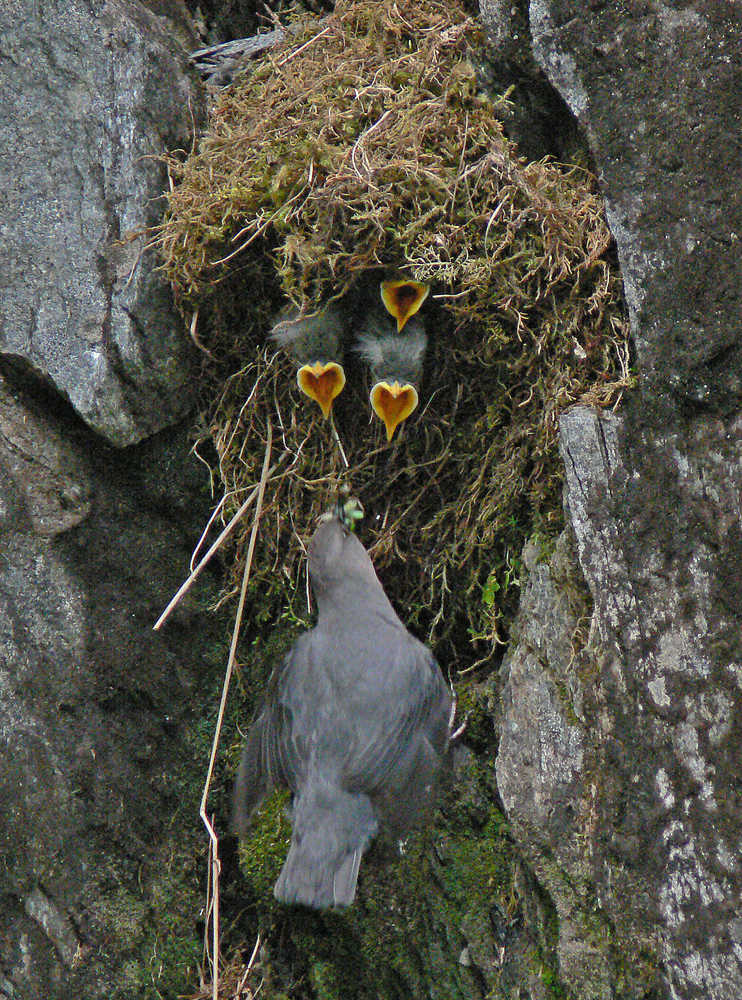This essay will consider male parental care in birds and mammals. Both birds and mammals evolved from reptiles, and some ancient reptiles did have parental care by at least one parent, but modern reptiles have no record of male parental care, so they will be ignored here. As is true for fishes and amphibians, the factors that govern the evolution of patterns of parental care are no doubt several and still subject to debate and future research.
Biparental care is the usual thing among birds: both parents tend the young in over 90 percent of bird species. Females often do the incubating of eggs, but her male may feed her while she does so and the males generally help feed the chicks. This is the case for American dippers, for instance; as one of my field techs said, during our intensive study of this species: “There are no dead-beat dads!” In fact, we even know of one hard-working dad who raised at least a few of his chicks by himself, after his mate disappeared. The emperor penguin male goes a step further: he incubates a single egg on his webbed feet while his mate goes off to sea and feed; then they both tend the chick.
In some taxonomic groups of birds, including hummingbirds and grouse, females generally do all the work while the males run off to find more females. But even in these groups, there are unusual species in which both parents provide parental care; the willow ptarmigan is a local example.
Still more unusual are avian species in which males both incubate and tend chicks by themselves.
Here are a few examples: Spotted sandpiper females often lay one clutch of eggs and leave it to the male to do the incubation and guarding while she proceeds to lay another clutch (with the same or a different male) that she incubates and tends; this is a pattern found in several shorebirds.
In two of the species of kiwi in New Zealand, the Australian emu, and several other species, males incubate and tend the chicks alone. The cassowaries of Australian and New Guinean rainforests also have hard-working males, who incubate the eggs for weeks and then tend the chicks for months. They are fierce defenders of their little families: One day in the Australian rainforest I encountered a cassowary family; we were all looking for fallen fruits. Imagine looking up from the forest floor and seeing a very large bird, almost as tall as you and with claws that could rip you open, glaring at you from just a few short yards away. You can bet I apologized for my presence most abjectly and discretely retreated rather quickly!
What about the mammals? Virtually by definition, females are the ones that feed the infants, and lactation is considered to be the single most expensive thing a female mammal ever does. Dependence of the infants on mother’s milk means that females are always involved in parental care, so uniparental care by males is not an option. Biparental care is not common, but males are reported to be closely involved with parental care in about 5 percent of all mammal species. The best known cases include carnivores and primates, but regular male care occurs in other groups, too. Here are some examples:
Among the carnivores, the males of foxes and wolves regularly bring food to their young. Asian raccoon dog males participate in all forms of parental care except lactation, and also tend the female during the birth process. Male members of packs of African wild dogs bring food to lactating mothers and young pups.
Male baboons and macaques carry babies around, which may help protect the infants from predators or intruding strangers. However, this situation is more complex than that, because the male may obtain direct benefits too: a male with a baby in his arms suffers less aggression from other males and may also gain favor with the infant’s mother. And if there is a fight between males, the infants are in great danger. In some small New World primates called tamarins, including the cotton-top tamarin, males regularly carry and care for babies. Males of the endangered pied tamarin reportedly do most of the parental care except for lactation.
Wild horses and zebras live in groups, often a male’s harem of females plus foals. Males defend their foals and females from predators.
It’s a rare herbivore that helps feed the young ones, but male beaver do: they regularly help build winter caches of branches on which the whole family, but especially the still-growing young ones, feed; they also help maintain dams that make the pools that protect the lodge and facilitate transport of branches. They stay with the rest of the family in the lodge over the winter, interacting and providing body warmth. Among the smaller rodents, males of the California deer mouse reportedly brood the young, keeping them warm until they can regulate their own body temperature. Prairie vole males cache food, brood and groom the babies, and even retrieve them if they wander out of the nest.
• Mary F. Willson is a retired professor of ecology.

